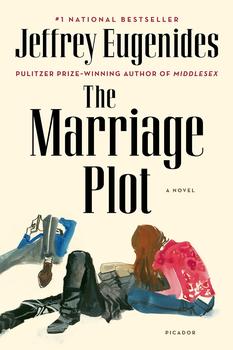Summary | Excerpt | Reading Guide | Reviews | Beyond the Book | Readalikes | Genres & Themes | Author Bio

A Novel
by Jeffrey Eugenides
At the corner of Benefit and Waterman, they crossed behind the white steeple of First Baptist Church. In preparation for the ceremony, loudspeakers had been set up on the lawn. A man wearing a bow tie, a dean-of-students-looking person, was tensely smoking a cigarette and inspecting a raft of balloons tied to the churchyard fence.
By now Phyllida had caught up to Madeleine, taking her arm to negotiate the uneven slate, which was pushed up by the roots of gnarled plane trees that lined the curb. As a little girl, Madeleine had thought her mother pretty, but that was a long time ago. Phyllida's face had gotten heavier over the years; her cheeks were beginning to sag like those of a camel. The conservative clothes she wore - the clothes of a philanthropist or lady ambassador - had a tendency to conceal her figure. Phyllida's hair was where her power resided. It was expensively set into a smooth dome, like a band shell for the presentation of that long-running act, her face. For as long as Madeleine could remember, Phyllida had never been at a loss for words or shy about a point of etiquette. Among her friends Madeleine liked to make fun of her mother's formality, but she often found herself comparing other people's manners unfavorably with Phyllida's.
And right now Phyllida was looking at Madeleine with the proper expression for this moment: thrilled by the pomp and ceremony, eager to put intelligent questions to any of Madeleine's professors she happened to meet, or to trade pleasantries with fellow parents of graduating seniors. In short, she was available to everyone and everything and in step with the social and academic pageantry, all of which exacerbated Madeleine's feeling of being out of step, for this day and the rest of her life.
She plunged on, however, across Waterman Street, and up the steps of Carr House, seeking refuge and coffee.
The café had just opened. The guy behind the counter, who was wearing Elvis Costello glasses, was rinsing out the espresso machine. At a table against the wall, a girl with stiff pink hair was smoking a clove cigarette and reading Invisible Cities. "Tainted Love" played from the stereo on top of the refrigerator.
Phyllida, holding her handbag protectively against her chest, had paused to peruse the student art on the walls: six paintings of small, skin-diseased dogs wearing bleach-bottle collars.
"Isn't this fun?" she said tolerantly.
"La Bohème," Alton said.
Madeleine installed her parents at a table near the bay window, as far away from the pink-haired girl as possible, and went up to the counter. The guy took his time coming over. She ordered three coffees - a large for her - and bagels. While the bagels were being toasted, she brought the coffees over to her parents.
Alton, who couldn't sit at the breakfast table without reading, had taken a discarded Village Voice from a nearby table and was perusing it. Phyllida was staring overtly at the girl with pink hair.
"Do you think that's comfortable?" she inquired in a low voice.
Madeleine turned to see that the girl's ragged black jeans were held together by a few hundred safety pins.
"I don't know, Mummy. Why don't you go ask her?"
"I'm afraid of getting poked."
"According to this article," Alton said, reading the Voice, "homosexuality didn't exist until the nineteenth century. It was invented. In Germany."
The coffee was hot, and lifesavingly good. Sipping it, Madeleine began to feel slightly less awful.
After a few minutes, she went up to get the bagels. They were a little burned, but she didn't want to wait for new ones, and so brought them back to the table. After examining his with a sour expression, Alton began scraping it punitively with a plastic knife.
Phyllida asked, "So, are we going to meet Leonard today?"
"I'm not sure," Madeleine said.
"Anything you want us to know about?"
Excerpted from The Marriage Plot by Jeffrey Eugenides. Copyright © 2011 by Jeffrey Eugenides. Excerpted by permission of Farrar, Straus & Giroux. All rights reserved. No part of this excerpt may be reproduced or reprinted without permission in writing from the publisher.
Wherever they burn books, in the end will also burn human beings.
Click Here to find out who said this, as well as discovering other famous literary quotes!
Your guide toexceptional books
BookBrowse seeks out and recommends the best in contemporary fiction and nonfiction—books that not only engage and entertain but also deepen our understanding of ourselves and the world around us.